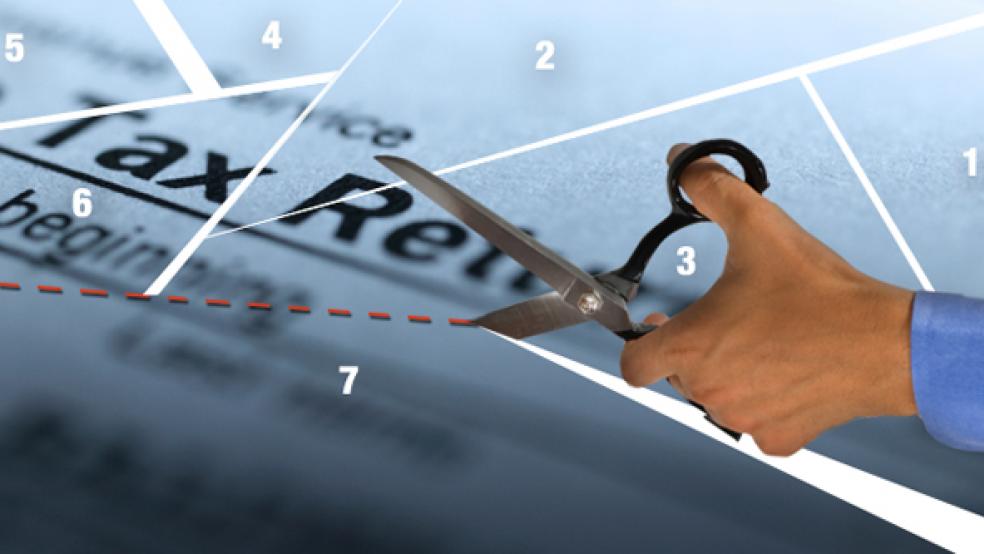The 2012 tax debate was formally joined on Capitol Hill on Wednesday, as the Republican controlled House voted to extend Bush era tax cuts to all Americans, including the wealthiest, following Senate action last week in which the Democratic majority pushed through a measure that would raise taxes on the wealthiest two percent of taxpayers.

Neither measure will go anywhere – certainly not before the November election – and much of the rhetoric and debate was as much political sloganeering as thoughtful economic discourse. But the action in the two chambers mirrored the tough talk over taxes on the campaign trail, with President Obama portraying himself as the champion of the middle class while Republican challenger Mitt Romney argues that any tax increase would undercut small businesses and drive up unemployment.
“These are classic 'show votes' in Congress, designed to get everybody on the record without any real prospect of legislation passing both houses,” said Larry Sabato, a University of Virginia political analyst. “The votes will be sued in TV ads. It's more red meat for the base. And the two party bases are well over 90 percent of this election.”
At issue is the fate of two major tax cuts enacted in 2001 and 2003 during the administration of former president George W. Bush that were extended once before and now are set to expire at the end of the year, just when more than $1 trillion of automatic defense and domestic spending cuts are also scheduled to begin to take effect under sequestration. Unless Congress and the administration act before January 2, taxes will shoot up by $4 trillion over the next decade.
That additional revenue would lower the deficit, but the Congressional Budget Office warns it would also thrust the economy back into recession. Economic growth slowed to 1.5 percent of GDP between April and June, in part because businesses were postponing hiring and investment until there was more certainty about future tax rates.
RELATED: Ten ‘Kicked Cans’ that Can Send the U.S. Over the Cliff
Central to the debate is Obama’s class warfare theme that economic growth and recovery can only be achieved by first helping the middle class, rather than engaging in more Republican “trickle-down” economics, with the wealthiest Americans reaping the greatest economic benefit. Romney in contrast has embraced traditional Republican dogma that the key to success is cutting taxes and government red tape and shrinking government.
Yesterday, the Republican dominated House voted 256 to 171 to extend those nine-year old tax rates for another year across the board, with the goal of rewriting the entire federal tax code next year. Nineteen Democrats voted for the bill and one Republican voted against it. House Republicans argued that it would be a fatal mistake in a weak economy to raise taxes even on the upper middle class.
“This election is about jobs and the economy," said Republican House Majority Leader Eric Cantor of Virginia. "The choice is clear. Either you want growth or you want more taxes."
House Speaker John Boehner, R-Ohio, added, “Two years ago the president said we shouldn’t raise taxes in the time of the slow economy and I agreed, Republicans agreed . . . . And now the president wants to raise taxes on the so-called rich, which is really small business owners. Some 750,000 jobs will be destroyed at a time when American people are saying, ‘Where’s the jobs? . . . My goodness raising taxes in this economy is a terrible mistake.”
Democrats saw the issue differently. House Minority Whip Steny Hoyer, D-Maryland, blasted Republicans for wasting time by not coming together to extend tax cuts for middle-class Americans -- a move he said both sides agree on.
“This is about whether the first priority of the Republicans is protecting the very wealthy, while holding hostage middle income families. Let middle income families be released,” said Rep. Sander Levin, D-Michigan, the ranking member of the tax-writing House Ways and Means Committee.
This bill shows just what the priorities of the majority are,” said Rep. Bill Pascrell, D-New Jersey. “For you to continue to say that this is going to be a burden on small businesses is delusional. In 2008, we were 11 trillion dollars in debt. We quite simply can’t afford to give millionaires another tax break. You shrunk the middle class with your great economic ideas between 2001 and 2008. What you did was make the rich richer.”
But Raising taxes on incomes above $250,000 did not sit well with all Democrats, including former House Speaker Nancy Pelosi and NY Senator Chuck Schumer. They represent constituents in the metropolitan areas of San Francisco and New York respectively – two high cost-of-living regions where household incomes in the range of $250,000 do not qualify people as wealthy. They argued for a millionaire tax, similar to the Buffett rule. But Obama and Senate Democrats rejected the idea.
Late last week, the Senate voted 51 to 48 to approve a Democratic version along the lines that Obama favors that would allow tax rates to rise on incomes, capital gains and dividends for earnings of more than $250,000 a year. Instead of trying to filibuster action on the Democratic measure, Senate Minority Leader Mitch McConnell, R-Ky., allowed the vote in return for a prior up or down vote on the Republican approach that would have extended all the Bush era tax cuts for one year.
That GOP plan went down, 54 to 45, but the Republicans were able to get on the record in favor of an across the board extension of the tax cuts, while forcing a handful of Democrats with tough reelection campaigns to vote in favor of raising taxes for some.
Both parties insisted that they had gotten the upper hand in the showdown. Some Democrats said that by insisting that wealthier households pay more, they would spread the pain necessary to get the budget deficit under control and steer clear of the “fiscal cliff” at the end of the year. Moreover, explained a senior Democratic Senate aide, “Democratic senators can go back to their states with a clear message: We passed a tax cut for 98 percent of Americans. And Republicans oppose that as well as tax cuts for 25 million middle-class families.”
The Republicans see the House vote as a clear winner for their congressional candidates and for Romney.
“Everybody’s got a little different twist, but I would say the Democrats want to impose taxes so badly on small businesses who are creating jobs that they are willing to risk putting the country into a recession, rather than deal with taxmageddon and deal with the sequester,” said Sen. John Cornyn of Texas, the head of the Senate Republican campaign committee. “Obviously the Democrats have taken their polls and they focus-grouped it, but I don’t think they looked at the larger picture about how those taxes will impact small businesses and job creators” and how it will hurt the economy.
RELATED: Down and Out on $250,000 a Year
Despite the competing party claims that their tax policies are popular with voters, polls show that the public has mixed views on the topic. A Pew Research Center poll taken in July found that by a margin of 44 percent to 22 percent, Americans felt that raising taxes on incomes over $250,000 a year would help the economy while 24 percent said it would make no difference. And by a similar majority, the respondents said that raising taxes on incomes over $250,000 would make the tax system fairer.
However, a July 13 poll by Marist and McClatchy showed that a majority Americans want the Bush tax cuts extended for everyone, despite a strong push by Obama to eliminate them on higher incomes. The poll found 52 percent of registered voters saying they want all the tax cuts extended, including the tax cuts for incomes above $250,000, while 43 percent want the cuts extended just for families with incomes below $250,000 a year.
Notably, young voters ages 18-29 favored tax cuts for everyone by a margin of 69-29, the largest margin of any age group.
The controversy is almost certain to be fueled by a new analysis by the Brookings Institution and the nonpartisan Tax Policy Center showing that Romney’s plan to overhaul the tax code would result in cuts for the wealthiest five percent of Americans and larger tax bills for everyone else.



